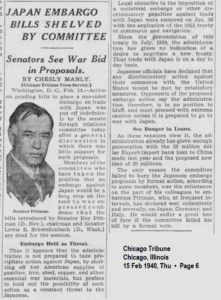The Shadows of History: Understanding Modern Economic Sanctions Through the Lens of Past Conflicts

In today’s geopolitical climate, the economic strategies employed by the United States against nations like Russia bear a striking resemblance to actions taken against Japan prior to World War II. Understanding these parallels not only sheds light on contemporary politics but also raises critical questions about the long-term consequences of such strategies.
Historical Context: The U.S. and Japan Before WWII
Back when President Franklin D. Roosevelt was in office, his administration implemented a series of stringent embargoes against Japan. As tensions mounted, Roosevelt froze Japanese assets and imposed significant restrictions on essential supplies such as oil and metals. He even threatened a blockade on Japanese vessels seeking alternative fuels. As history shows, these actions would culminate in the attack on Pearl Harbor, a direct consequence of Japan’s desperation to eliminate the perceived threat posed by U.S. military presence in the Pacific.
Economic Warfare: The Neocon Strategy
Today, we are witnessing a similar playbook in action. The current U.S. administration’s approach to Russia echoes the neocon strategies of the Roosevelt era, where escalating economic sanctions have become the tool of choice to incite a political conflict rather than aggression against sovereign nations.
During the late 1930s, seizing Japanese assets and progressively tightening trade restrictions were motivated by perceived threats and geopolitical strategy. In 1939, the termination of the longstanding commercial treaty with Japan and the subsequent Export Control Act of 1940 aimed specifically to restrict Japan’s access to critical materials. This paved the way for a series of embargos, similar to those now imposed on Russia, designed to isolate a nation without declaring war—an approach that cleverly bypassed Congressional scrutiny.
As an insightful note, the majority of Japan’s raw materials at the time came from the United States, much like Russia relies on specific trade relationships today for energy and materials. The parallels are stark: sanctions intended to throttle a nation can lead to desperation and unintended consequences.

The Moral Quandary: Public Sympathy and Rhetoric
Interestingly, public opinion at the time also played a critical role in shaping policy. During the pre-war years, many Americans were sympathetic towards China because of Japan’s aggressive imperial actions. Similarly, today, a significant portion of the American populace views Russia as a major aggressor in geopolitical conflicts.
The intense public sentiment eventually fueled the moral justification needed for the U.S. government to act decisively, leading to the internment of Japanese citizens during the war—a dark chapter in American history. Fast forward to today, and we find that narratives around national security can quickly morph into policies that infringe upon civil liberties, as can be observed in various contemporary contexts.

The Consequences of Economic Sanctions
The economic isolation thrust upon Japan in the 1940s drove them to desperately seek resources in Southeast Asia, ultimately leading to a wider conflict that consumed millions of lives. The embargo on oil, in particular, was seen as the last straw—forcing Japan to take drastic actions that they believed were crucial for their survival.
Today, as we watch the economic landscape being shaped by aggressive sanctions against Russia, one cannot help but wonder if history is on the verge of repeating itself. The potential for miscalculation or overreach could lead to conflicts far more devastating than anyone currently anticipates. Is the West aware of its own history in using economic tools for political ends, and are we better equipped to handle those repercussions?
Final Thoughts: Learning from the Past
At Extreme Investor Network, we believe that understanding these historical precedents is vital for making informed decisions about investments and strategies in an increasingly complex global economy. As the rhetoric heats up and sanctions deepen, it is crucial for investors to consider the long-term implications of such policies—not just for the nations involved, but for the international financial markets at large.
Are we headed towards economic solutions or armed conflict? The wisdom of history suggests vigilance is necessary, as we inch closer to decisions that could redefine international relations for generations to come. Always remember: understanding history is not just about the past; it’s about ensuring a better future.
Join our community at Extreme Investor Network to stay updated on the latest economic insights and analyses that matter. Your informed decisions can pave the way for a more prosperous tomorrow!

